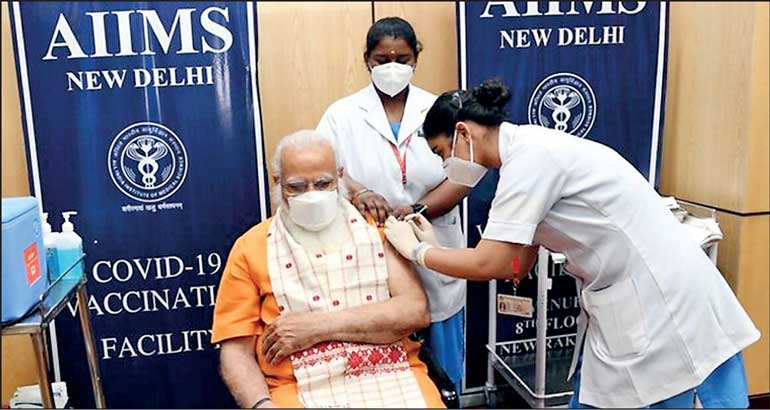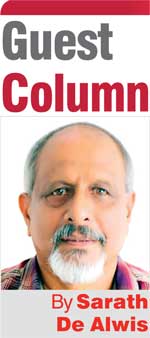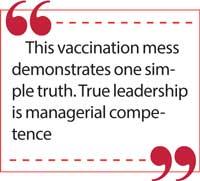Monday Feb 16, 2026
Monday Feb 16, 2026
Thursday, 8 July 2021 00:00 - - {{hitsCtrl.values.hits}}

Indian Prime Minister Narendra Modi receiving the vaccine – Twitter/Narendra Modi
 On Wednesday 30 June I received a text message that my wife and I would receive the second dose of AstraZeneca vaccine on Thursday 1 July at 2 p.m. at the Sugathadasa stadium. My wife turned 79 in May. I will reach 79 in August.
On Wednesday 30 June I received a text message that my wife and I would receive the second dose of AstraZeneca vaccine on Thursday 1 July at 2 p.m. at the Sugathadasa stadium. My wife turned 79 in May. I will reach 79 in August.
We turned up at the Sugathadasa stadium on 1 July at 40 minutes past 12. We left the Sugathadasa Stadium at 20 minutes past four. It was an excruciatingly overwhelming ordeal.
I stood in a queue for three hours and a little more. My first instinct on seeing the long queue meandering up and down the stepped pavilion of the Sugathadasa Stadium was to say, ‘to hell with the second dose and let’s go home’.
But I could not do that. I had no moral right to impose my haughty contempt for a world gone mad on my wife of 52 years, who was determined to have the second dose of the vaccine. So I decided to be loyal and stayed.
Having undergone heart bypass surgery 10 years ago I am on regular beta blockers and meds to ease angina. I am experiencing early signs of osteoarthritis. So, I tried to see it in a way that will ease my discomfort.
I had with me the slim large type 103-page publication by Julian Baggini ‘A Short History of Truth’. It helps one to understand the world of alternate truths created by populist patriotic messianic leaders. It has some interesting subtitles – Eternal Truths, Authoritative Truths, Esoteric Truths, Reasoned Truths, Empirical Truths, Creative Truths, Relative Truths and Powerful Truths. My having to stay the next few hours in the queue for my vaccine was one such powerful truth. I got into philosophical musings to ease my pain and discomfort.
Queue of septuagenarians
I thought about my six adorable grandchildren. Then I thought about what Julian Baggini calls the authoritative truth which reminded me of a Periclean peroration with the aid of a teleprompter.
While I find living under the stifling atmosphere of this inept autocracy absolutely stomach churning, getting the jab to stay alive, to see my grandchildren finishing university was an extremely pleasant idea.
To live another three or four years to see this lot getting booted out due to the pent-up wrath of an exasperated electorate was an awfully exciting, spellbinding idea.
So, I stayed in the queue of septuagenarians for three hours and a little more. I marvelled at the sight of septuagenarians waiting in passive hope. There was the occasional diversion of someone literally willing under the strain. 
It was a great experience. While on the second steppe of the pavilion I could see the agitated lower limbs quavering in uneasy motion on the upper steppe. I did not see any bare feet. A tribute, I suppose to the open economy that made ‘barefoot’ a brand.
On the upper steppe, I saw a confusing mix of sandals, slippers, stilettos, Bata, Clarks, Nikes, Reeboks, and Pumas. An eloquent testimony to the inequity of the vaccine circus enacted in the metropolitan sprawl. That explains the logic of building a world-class city on reclaimed land while spawning turtles who do not survive monsoon weather.
It is a sad commentary of our confused socio-political ethos that seeks to preserve the tribal while yearning for the global.
Ageing matrons were painfully moving forward while their bulging bunions indicated a determination to move in opposite direction. I looked up to see the owners, only to discover wrinkled faces telling desolate stories of vanished dreams.
Reaching the end of the first lap, I parked my frail wife at the business end of the pavilion to join me when I reached the end of the queue on the third and final lap.
At this point, two Police officers, one superior flaunting brazenly disagreeable authority and a younger officer with an obvious empathy for the old and infirm, formed batches of 10 who then moved across the grounds to the building where the vaccine was administered.
Those who arranged the show would have not bothered to check with the meteorological forecast. It rained. It drizzled and was generally cloudy.
At the other end, Army personnel checked the cards and cleared us for the jab. Clumsy thinking with military precision seems to be the new ballgame in town. That is another story for another day.
Are our leaders vaccinated?
When I got back home, I googled for images of either our President or our Prime Minister who are both over 70 getting the vaccination. I did not find any. Then I searched for South Asian leaders who got the vaccine. I found pictures of India’s Prime Minister Narendra Modi, Pakistan’s Prime Minister Imran Khan, Nepal’s Prime Minister KP Sharma, Maldivian President Ibrahim Mohamed Solih and Bangladeshi Prime Minister Sheikh Hasina receiving their vaccines.
Why cannot we find images of our Prime Minister or President receiving the vaccine? May be our leaders are true servants of the people. It is possible that they have decided to wait until the entire nation is vaccinated. If that is the case, why do we find images of other leaders in the region getting the vaccine? May be that other leaders of the region have devised credible plans to vaccinate their people and wanted to reassure their backward people of the importance of getting the jab.
In the whole of South Asia only we had a C.W.W. Kanangara and only we enjoyed universal franchise since 1931. The people of India, Pakistan, Nepal, Bangladesh, and Maldives do not claim a 95% literacy rate as we do. Only we have monks in control of nightingales claiming that they alone can anoint leaders and direct vaccine distribution.
Inspiring leadership
That brings me to the main point of departure of this essay. It is about inspiring leadership in the hour of crisis. These are thoughts that passed my mind in the long wait for the second AstraZeneca jab at the Sugathadasa stadium on Thursday 1 July.
The ancient Chinese thinker Lao Tzu who is supposed to be the founder of Daoism defined leadership in 630 BC: “A leader is best when people barely know he exists, not so good when people obey and acclaim him; worst when they despise him. “
Closer to our age Machiavelli the political theorist of the age of renaissance defined leadership in a more pragmatic terms taking account of the coercive and corrosive nature of power and leadership.
One ought to be both feared and loved, but as it is difficult for the two to go together, it is much safer to be feared than to be loved. Still a prince should make himself feared in such a way that if he does not gain love, he at any rate avoids hatred.
Leaders are those who provide direction in dark times. In times of despair, when people are exhausted by uncertainty, great leaders have emerged to change history by inspiring courage, offering hope.
Such feats of leadership are remembered for their substance and impact. The styles vary but the message is essentially celebrated by later generations for their substance which often turn out to contain the distilled essence of human capacity for resilience in times of peril.
A great speech captures the imagination of a nation because the ideas are constructed with integrity. The sincerity of the words of genuine leaders become lyrical poetry in the minds of ordinary people.
A great address to the nation must contain a serious, worthy proposition. Blaming the predecessor’s myopia offers no proof of the current leader’s vision or far sight.
There is great wisdom in the adage “Lies, Damn Lies and Statistics.”
Inspiring a nation is no easy task. That involves a genuine appeal to the finest of values cherished by the nation. If it involves setting new ideals, such new ideals must have the power to penetrate the collective conscience of the nation.
The purpose of an address to the nation is to persuade the people to pursue a path worth pursuing. It should appeal to the hearts of the ordinary and excite the minds of the discerning.
In times of extraordinary crisis leaders address the people to assure them that the leader is prepared to walk beside the people. The people already know why. What they need to know is how. The people need to know what the plan is.
True leadership is managerial competence
True power in this terrible crisis of a pandemic lies in absolute clarity. In a world overrun with information relevant as well as irrelevant, true power lies with those who could provide a clear vision. This vaccination mess demonstrates one simple truth. True leadership is managerial competence.
Let us examine the question of leadership in history. It is fashionable for mediocre commentators to attribute an accomplishment reached by a collective resolve to some great leader. Sycophancy is not history.
I am disappointed and disheartened by the way we are confronting this pandemic. Waiting for the jab, I had four hours and more to think about the current leadership and our present dilemma of who and what should replace them.
I thought about the rejects who returned to Parliament. I reflected on the son who claims the doubtful legacy of a father under whose tyrannical presidency I suffered untold misery. I meditated on the tedious sermons of the well-meaning idealist trapped in Marxist Leninist circumlocution.
Shifting my weight from one leg to the other for three hours and more it occurred to me. Dreams are indeed renewable. My grandchildren would experience a new world. That world is waiting to be born. All it needs is to create a ‘new equilibrium, ecologically more friendly, socially just and morally decent.
Do we need another leader, or do we need to reinvent ourselves? Should not we not stop looking for leaders who return from the city of angels (pun intended)? What makes a man, or a woman rise above others to assume the mantle of leadership? Why are some more drawn to the burdens of leadership than others? What makes a great leader?
Waiting for the vaccine while tortuously inching forward in that agonising queue, I asked myself how history’s great leaders have risen above their contemporaries to navigate through adversity, defying all odds to achieve goals not for themselves or family but for all the people they truly served.
I do not believe in the great man theory. That belongs in tribal folk lore. Sitting round a campfire, maladjusted tribal warriors recount the horror heroics of tribal leaders. Need we return to such permittivity?
Such storytelling round imagined tribal campfires prompted the sociologist philosopher Herbert Spencer to the remark on would be great leaders: “Before he can remake his society, his society must make him.”
Personally, on this business of leadership, I would stay with Karl Marx: “Men make their own history, but they do not make it as they please but under circumstances existing already, given and transmitted from the past.”
 In fluid times of crisis, leadership matters
In fluid times of crisis, leadership matters
In fluid times of crisis, leadership matters. It is the leadership that can make an accurate diagnosis of the problem and determine the remedy. A leader does not make waves. The leader is a surfer who rides the big wave. We must not confuse leadership with puny minds creating puny ripples in puny puddles. The big wave usually submerges false prophets and fake leaders.
Tribes demand heroes. Nations demand leaders who can pursue a shared vision. The idea of the great warrior leadership is as old as the ‘Ramayana’ and the ‘Mahabharata’ or ‘The Odyssey’ and ‘The Iliad’. For primitive minds, it is convenient and comfortable to seek heroes. Not all heroes are leaders, and all leaders are not heroic.
In the late ’90s, the editorial board of the Time Magazine debated on who should be featured on its January 2000 cover as the most important person of the 20th century. Their shortlist included the two war heroes Churchill and Roosevelt. It also included Mahatma Gandhi and Albert Einstein.
They picked Einstein on grounds that his extraordinary creativity had the greatest impact on the 20th century and the new century of information and knowledge. Einstein declined the presidency of Israel. TIME Editor and Einstein’s biographer Walter Isakson describes him not as a leader but a beacon.
The beacon of humanity would have foreseen the butchery in the Gaza strip. After a lifetime of flaunting his authority, Einstein never ceased to be amused by the fact that he was considered an authority. Authority does not seduce true leaders.
Leadership means mobilising people for a purpose. In this pandemic, leadership means mobilising the people for the specific purpose of containing the virus and preserving life. It is a shared purpose. It is a collective goal.
The children of Hamlin followed a legendary leader – the Pied Piper – to oblivion.
PS. Just when I reached the end of this essay an old friend from my days at Lake House called me to say that another of our old colleagues who is now 95 had gone to the Sugathadasa Stadium. He had not waited in the queue. Luckily, another colleague who is still active in the profession had alerted him to the vaccine being administered on Friday at a CMC outlet in Kirulapone. He has got it with no fuss. I am glad for him. Therein lies a tale. Chaos with military precision is the new game in town. Left right they march. Left does not know what the right is doing and vice versa.

Pakistani Prime Minister Imran Khan receives the Sinopharm vaccine – Handout via Xinhua

Nepal’s Prime Minister K.P. Sharma receives a jab of COVID-19 vaccine – Xinhua

Maldivian President Ibrahim Mohamed Solih receiving his vaccine – Malé President’s Office

Bangladeshi Prime Minister Sheikh Hasina receives her vaccine at her official residence – Dhakka Tribune